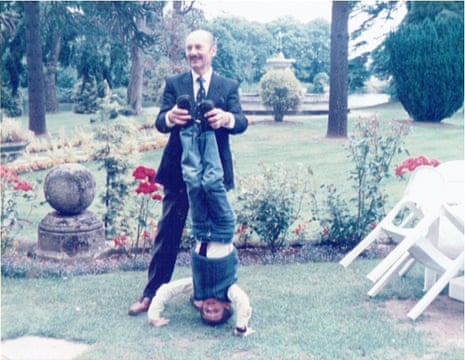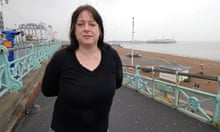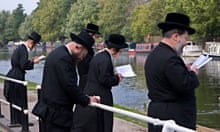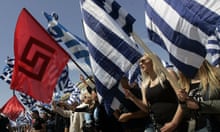My grandfather’s funeral service took place on New Year’s Eve 2002 at the Anglican church in Chalfont St Giles. The vicar kept referring to my grandfather as Donald and had to be corrected (his name was Gordon but he was known as Don). What I remember most is something my grandmother, Dorothy Jeffreys, said before the service. She was distraught and, I think, on some sort of tranquilliser and kept insisting Don wouldn’t have wanted the send-off to be in a church, it should have been a synagogue. I asked her why and she said, “Because we’re Jewish.”
This was the first I’d heard of it. Not that I’d ever given it much thought but I’d always assumed that my father’s family was British as far back as you could go. It was only later that I realised that my grandparents’ Englishness was cultivated. With their tweeds, golf, expertly made gin and tonics and personalised number plates, they were more English than the English.
After the funeral, I went out drinking with my best friend from university, a Jewish girl from Southend. “Mazel tov,” she said to me when I told her about my discovery. I had no idea what mazel tov meant (“good luck”). I knew almost nothing about Judaism. I wanted to find out more about my family.
Over the next few months, I pestered my father for information about his family. Had he had a barmitzvah? No. He was raised without religious belief but converted to the Church of England in 1972 so that he could marry my mother in a church. Where was his family from? Poland it turned out. He seemed reluctant to talk. For him Jews – and he didn’t consider himself Jewish – were “of the faith”. Judaism meant old men with beards muttering in temple. I was frustrated by how little interest he took in his history but I learned later that he was almost as much in the dark as I was.
Just before my grandfather Gordon died, he told my father that our family surname, Jeffreys, was a recent creation. The name was changed from Jaffe in 1927 so that my grandfather could attend Mill Hill school in north London. His parents worried that he wouldn’t be accepted with such an obviously Jewish name.
At my grandmother’s 90th birthday, I sat next to Louis Davis, a cousin of my grandmother’s and, I learned during the meal, an observant Jew. He asked where I lived in London. Bethnal Green, I said. I remember his reply: “Bethnal Green, I know Bethnal Green, that’s where your grandmother’s family are from. It’s horrible. Why do you want to live there?”
Then he gave a speech. It concerned the Levy family, my grandmother’s family, fleeing pogroms in 1890s Poland to poverty in the East End of London, and then the great move west and the founding of a temple, Ealing synagogue. The way Louis told it, it was like Moses leading the Jews out of Egypt. I was moved but also taken aback. This was some serious Judaism. I wasn’t the only one unnerved by it. My father sat through the whole thing with a face like thunder. I asked him later what was wrong and he just said that he hated all the Jewish stuff. He was English – the exodus from Poland meant nothing to him.
I wondered what could have happened to make my father turn his back on his heritage so vehemently. One night when it was just the two of us having dinner, he told me about a schism that occurred in the family when Aunt Tony, my father’s sister, married a gentile. My father’s parents had already given up most of the trappings of Judaism and sent their children to Christian schools but when my aunt married a gentile in a church on a Saturday – the Sabbath – it was too much for Michael Levy, my grandmother’s father. He tore up the wedding invitation and posted it back in tiny pieces. My aunt married her gentile and my father married out too.
Michael Levy was the patriarch of the family – a formidable man. He was well loved by his family and by the Jewish community in Ealing, but also uncompromising and implacable when crossed.
Ealing synagogue flourished from 1919 until the 1980s when membership declined. It’s a microcosm for Judaism in England and it was what, I suppose, Michael Levy was trying to prevent. Stubborn men like him kept the Jewish identity going through thousands of years of persecutions, expulsions and emigrations.
Ironically, Michael Levy wasn’t even particularly observant. He played golf most Saturdays rather than attend temple. Golf is an important thing in our family. Just after he died, my grandmother confided in me that my grandfather Gordon worried about my lack of interest in the game. Both my brothers played. Golf was a badge of belonging alongside the tweed and the G&Ts. It was also a way of communicating. My father used to play golf with his grandfather, Michael Levy. Not playing golf meant I had nothing to talk to my own grandfather about. He was another difficult man. I knew that he loved me but he was rarely warm. If I’d asked about his history, I am sure he would have delighted in explaining it to me.
Sometimes I do wish I had been brought up Jewish or at least part of such a rich culture and tight-knit community. But I have no urge to convert, although I am jealous of the easy cultural Jewishness like that of my friend Anya. It’s something I’ll never be part of. But my wife is American and her stepfatheris Jewish. His mother, Nana Rosie, saw a photo of me before we had met and said: “Do I detect that he’s a member of the tribe?”



